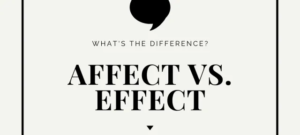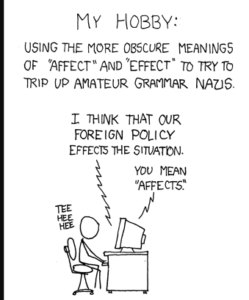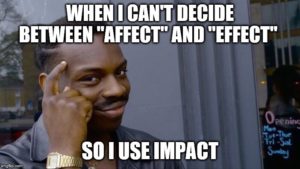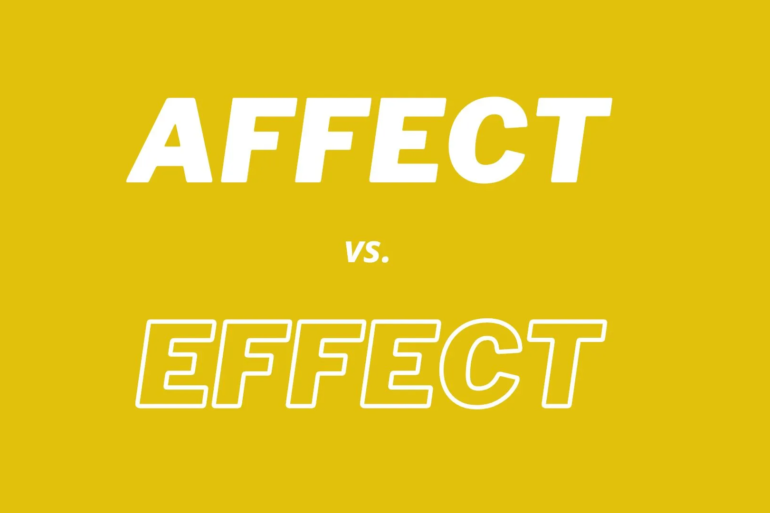Affect vs Effect Explained
When it comes to writing, the misuse of certain words can lead to confusion for even the most experienced writers. Two such words are the homophones “affect” and “effect” – both sound similar, but they actually have very different meanings. In addition, the two words can also be used as verbs or nouns.
This blog article will explain the difference between affect and effect in detail so that you can use them accurately in all your communications. We’ll explore how each word is used as a verb or noun, provide examples of their usage, and offer some helpful tips on avoiding common mistakes when using these homophones.
- Affect vs Effect
- How to Use Affect and Effect as Verbs
- Examples of Affect and Effect Used as Verbs
- How to Use Affect and Effect as Nouns
- Examples of Affect and Effect Used as Nouns
- When to use Affect and Effect
- Other contexts and usage of Affect and Effect
- Common Mistakes When Using Affect and Effect
- Tips for Avoiding Confusion on Affect vs Effect
Affect vs Effect
Affect and Effect are two commonly confused homophones that writers should recognize the distinction between in order to use them correctly. Affect is predominantly used as a verb, which indicates change and usually comes before a noun.

In comparison, effect is most commonly employed as a noun and represents the result or consequence of some type of cause, or change. For example, ‘The weather affects my commute’ expresses how the conditions of this particular day have changed my journey, while ‘The effect of poor air quality has been felt all around town’ underlines what outcome was observed as a result of this issue. Knowing how Affect and Effect differ can help improve accuracy when writing complex pieces and ensure that your text concisely conveys what you intended it to.
How to Use Affect and Effect as Verbs
Affect and Effect as verbs
Affect is a verb meaning to have an influence upon, or to produce a change in something. Effect is also a verb that means to bring about or implement, typically indicating the completion of an action.

The Key Difference
The key difference between Affect and Effect is that one produces a change while the other brings about a result from that change. For example, if you want your team morale to increase, Affect can be used as the verb because it will help cause them to become more positive, whereas Effect may be used after the fact once they have been influenced and changes have come about—in this case.
Effect may refer to more tangible results like achieving team goals. Affect vs Effect are two important verbs that are powerful in describing changes and their outcomes – understanding the difference between them is essential for effective communication.
Examples of Affect and Effect Used as Verbs
Example of Affect as a verb
Affect as a verb appears in literature and common usage, but its use varies greatly depending on the context. In literary works, affect is often used to characterize the emotions of characters, expressing their sorrow, joy, surprise, anger, and even neutrality. In non-fiction works, “Affect” can take on a more literal meaning to signify how things or behaviors are influencing one another. In common usage, Affect is often used today to describe experiences.
For example, someone may express that their favorite food “affects” them positively ensuring they continue to eat it regularly.

Further pointers:
Affect can also be employed to suggest subtle nuances such as when an individual states that the news “affected” them with disbelief over what had happened. Affect as a verb has been commonplace throughout language across many cultures and its application continues to be vast and diverse in both written and spoken forms.
Example of Effect as a verb
Effect, historically used as a noun, has increasingly been used as a verb in recent decades. Effect is used to describe the result or consequence of an action. Effect is often employed in literature to illustrate the power of human actions and convey their far-reaching implications.
In Harper Lee’s To Kill a Mockingbird, for instance, Tom Robinson’s trial serves to effect pervasive change by demonstrating how entrenched racial bias affects any pursuit of justice.
Further pointers:
Effect exists everywhere in common usage as well – phrases such as “effects change” and “effects progress” are commonplace examples of how this verb is put into action. Effect can also express feelings; for example, effecting surprise, delight or enthusiasm are all familiar in everyday language. Effect represents the culmination of effort and thought, signifying growth and evolution – it has become a powerful tool to articulate change on both an individual and collective level.
How to Use Affect and Effect as Nouns
Affect as a noun
Affect as a noun can be primarily defined as a feeling, emotion, or state of mind. Affect is used to express the result that an event has on someone’s emotions or thinking. Affect can be used in a variety of ways to express how an action has had an influence on someone’s state of being.
For example, the news had a very profound affect on her, leaving her feeling fearful and unsure. Affect can also be used to understand the effectiveness of different strategies, such as marketing – did the campaign have an affect on people’s buying habits? Understanding Affect as a noun and its use in sentences provides insight into both emotional responses to events and practical outcomes.
Effect as a noun
Effect as a noun carries a deep and broad meaning, that can be used to express numerous concepts. Effect lays emphasis on the result of something, in addition to representing ideas such as influence, impression, and existence. Effect can also refer to an object or action created by another force, an event that is consequent upon another, or the operation of a cause.
For example: “The student wanted to comprehend how increasing the K-rate would have an effect on the outcome of their experiment”.

Effect serves as a tool that adds detail and flexibility to sentence structures within the communication. Effect sustains its usage and remains essential across conversational contexts because of its manifold meanings, allowing communicators to highlight their desired idea with greater accuracy.
Examples of Affect and Effect Used as Nouns
Example of Affect as a noun
Affect used as a noun refers to the emotional feeling or response that someone has when faced with something which can be internal or external. An example of this is used by Nathaniel Hawthorne in “The Birthmark”, when he wrote about the protagonist’s passionate affect towards his partner, Alyson. Here affect is used to explore the nature of love and struggle within relationships.

Affect is more widely used in everyday conversations as a noun., For instance, when someone is surprised that their favorite sporting team only managed to tie with their opponent, they might say something like “That result doesn’t affect our chances of winning the series”.
Here, Affect used as a noun conveys the idea that something has happened which has caused an expected result to change. All of this together creates a powerful tool for being able to express emotions, ideas, and values effectively in everyday language.
Example of Effect as a Noun
Using the noun “effect” can enhance an insightful, engaging sentence or phrase. For example, Mark Twain once wrote that “The effective truth is that there is nothing more truly artistic than to love people,” highlighting the effect of genuine compassion. In literature, authors use this tool to illustrate how a result or consequence of an event can further impact a story’s character development.
Victor Hugo writes in his classic novel Les Miserables when Jean Valjean says, “It is here that the effect of soul-building suffering comes in.” Here, Hugo used the word to emphasize the positive outcome Jean was able to achieve through this adversity – something many characters in classic works of literature experience and explore.
In everyday language, effect as a noun is commonly used to talk about the outcome or result of something. For example, people often say, “What effect will it have?” when discussing the potential implications of an action. Other common examples include sentences like, “The effect was positive” or “The effect is already noticeable.”

It’s important to note, however, that effect as a noun should not be confused with affect; although they sound similar when pronounced aloud and their meanings can overlap in certain contexts, this pair of words actually refer to two very different concepts. Whereas effect typically means the result or outcome, affect more often conveys an idea of causation – i.e., how one thing influences another.
Other contexts and usage of Affect and Effect
Affect and Effect are often used interchangeably, and while they have similar pronunciations, their uses are distinct. Affect generally means to produce a change in somebody or something; it can also be utilized as a noun, referring to the emotion expressed without considering its cause.
On the other hand, effect is generally used as a noun to signify the result of change brought upon by Affect, but it can also be used as an adjective when signifying the plausibility of producing a result; both Affect and effect may also be employed as adverbs with similar connotations. It’s important for those learning the English language to realize that Affect and effect should not be confused – understanding their different applications can stand those learners in good stead when constructing intellectual arguments.
Common Mistakes When Using Affect and Effect
Affect and Effect are easily confused words, yet remember that the former is primarily used as a verb and the latter as a noun. Effect is used when you want to discuss the impact of an event or action on something. For example, “The changes had no effect on the overall result.” The phrase “He felt the effects of his promotion” provides an example of the correct usage of this word. A common mistake that arises from these terms is using Affect instead of Effect to describe results.

Affect refers to influencing events that are often internal, not an end outcome or result – so be careful! Another pitfall that can cause awkward language is failing to specify whether Affect or Effect should form part of a phrase.
For instance, if someone were to write “The promotion affected him positively”, they would be implying that he was directly influenced by the promotion – as Affect suggests influence on something rather than you have been in receipt of results due to it. To make sure you are using Affect and Effect correctly ask yourself if you intend to talk about influence or consequences – this will help guide your choice and save any potential confusion.
Tips for Avoiding Confusion on Affect vs Effect
Using Affect and Effect accurately can be challenging, even if you are well-versed in the language. To make sure that you are using Affect and Effect correctly, first understand the meanings of each word. When deciding which word to use, ask yourself if the sentence is about a “cause-and-effect” relationship or something else.
If you’re unsure, it’s usually better to stick with Effect than Affect. Additionally, remember that Affect is always used as a verb (or for Affect nouns such as Affects) and Effect is commonly used as a noun but can also be used as a verb.
However, in many cases Affect can also be used as a noun but it has a different meaning than the Affect nouns like Affects. To avoid confusion when using Affect and Effect, keep these tips in mind: be aware of the differences between Affect and Effect; determine whether you need to use a cause-and-effect relationship; opt for Effect over Affect until you get comfortable with both words; and always double-check your work!

